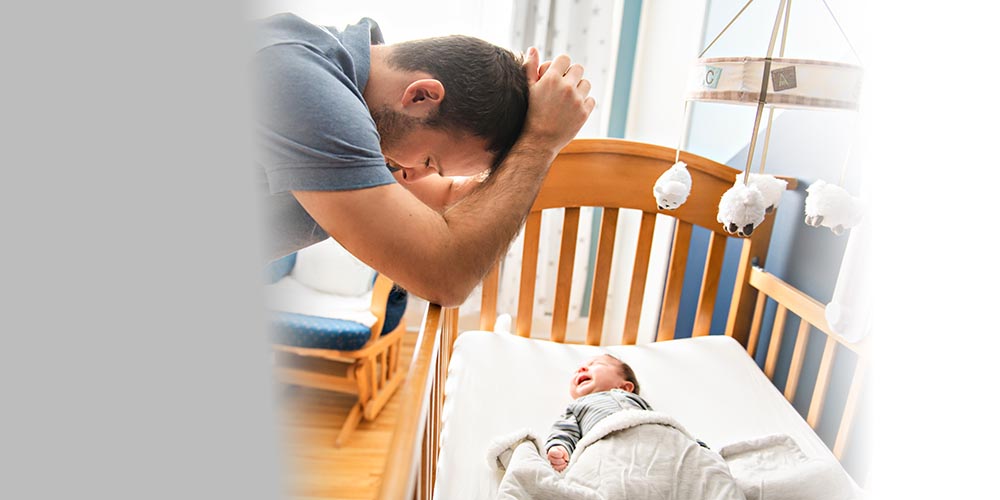It is believed that only women are at risk of developing postnatal depression after giving birth to a child. However, this is not completely true. Having a child is a life-changing event and it can take a toll over the mental health and emotional well-being of both the mother and the father.
Just because fathers do not give birth physically doesn’t mean that they are at a lesser risk of developing postnatal depression. Men might not experience the physical pain of giving birth to a child or recover from pain post delivery, but they also encounter the emotional upheavals as much as the mothers. Many a times, additional responsibilities, coping with new challenges and sleepless nights can wreak havoc on the mental health of fathers. Men may also experience changes in hormonal levels, which add physical and emotional challenges to their lives.
What are the causes for postnatal depression?
Approximately, eight percent men experience postnatal depression, but unfortunately, in majority of the cases it goes undiagnosed. Early diagnosis and medical intervention is crucial for the well-being of the family and the father.
There are numerous reasons behind development of postnatal depression in men, which can include:
- Dependence on liquor or other illicit substances
- History of anxiety and
- Less or lack of social support
- Financial stress or low income
- Rift in relationship with the mother
- The mother enduring postpartum
- Age of the father is less or not ready to take responsibility
- Living in a separate household from the child
What are the symptoms of postnatal depression?
Postnatal depression in men can manifest in signs different from women. Withdrawal from the family, extending working hours, or losing interest in activities could be some of the obvious signs for postnatal in men that should be addressed at the earliest.
Feeling overwhelmed, stressed out or exhausted is a very normal aspect of parenthood. Adjusting to parenthood is not an easy task. Knowing the requirement of the baby or dealing with the new challenges of parenthood is an arduous journey. But if the symptoms of exhaustion, irritability or stress linger on, and it is impeding daily activities, seeking professional help is advisable.
The symptoms of postnatal depression however symptoms can vary from person to person. The symptoms for postnatal depression in men are:
- Unknown physical pain
- Loss of energy
- A significant change in appetite
- Sudden weight gain or loss
- Insomnia
- Loss of interest in activities
- Feeling restless
- Feeling agitated
- Feeling sad or hopeless
- Excessive worrying
- Excessive irritability
- Indecisiveness
- Overwhelming emotions
- Intrusive thoughts of harming the baby
- Inability to concentrate
- Impaired ability to take decision
- Sudden changes in mood
- Feeling worthless or guilty
- Thoughts of suicide or death
Women are often screened for postnatal depression by their doctors. But, usually men underreport their symptoms due to fear of stigmatization in the society. This is one of the major reasons behind why postnatal depression in men can go undiagnosed and untreated.
Symptoms of depression do not alleviate by themselves. It becomes imperative to seek medical intervention before the symptoms get worse with time. The initial diagnostic procedures will be based on the medical assessment to rule out any underlying physical condition that could be responsible for causing depression or other mental health problems contributing towards depression.
How to cope with postnatal depression?
The father’s mental health is very important for the child’s development and can adversely harm the entire family. It is seen that the father’s mental health has a strong impact on the child’s mental health. Postnatal depression in men elevates the child’s risk of developing a psychiatric disorder in early childhood. It can also lead to a toxic relationship with the mother. In extreme cases of postnatal depression in men, they tend to develop aggression, violent behavior and anger.
Therefore, it is important to consider men’s mental health a priority and seek treatment timely. Lifestyle changes and coping skills can also help in alleviating symptoms. The coping skills can include:
- Regular exercise
- Practicing mindfulness
- Maintaining a healthy routine and diet
- Speaking about their mental health either to a family member or a medical practitioner
Treatment options available to combat postnatal depression
Treatment for postnatal depression is almost identical to clinical depression. Medical assessment prior to treatment determines the severity of the symptoms. The medical practitioner then customizes a treatment plan that will include medication, therapies or combination of both.
Medication includes antidepressants such as serotonin reuptake inhibitors (SSRIs). But in some people, medication can cause some side-effects. In that case, the person needs to inform the medical practitioner and go for alternative treatment.
Among therapies, talk therapy, cognitive behavioral therapy and interpersonal therapy are considered as well-proven treatment methods to combat postnatal depression. They enable an individual to come out of stigma, bring radical changes in their negative thinking process and develop positivity and enhance coping skills. However, men grappling with postnatal depression prefer couple therapy or individual therapy to alleviate symptoms.
It is evident that men with postnatal depression have benefited from group therapy, and support groups. These treatment models have worked fine with men who are lacking support from the family or partner while battling postpartum depression.
How we can help?
Postnatal depression in men can go undiagnosed for years. However, it is 100 percent treatable. If you are a new father going through the struggles of parenting and battling with depression, we are here to help.
Athena Behavioral Health is one of best mental treatment centers in India. Our treatment centers provide well-tailored customized treatment programs that best fit individual requirement. We provide residential and outpatient treatment programs along with evidence-based therapies. To know more, call us now on 9289086193 and get immediate assistance.
Visit us : Mental Health Treatment Facilities, Best De Addiction Centres in Delhi,Best Psychiatric center in Delhi gurgaon






